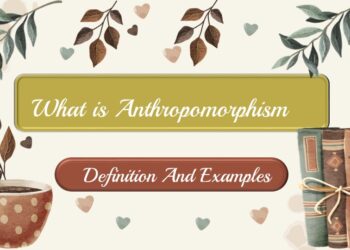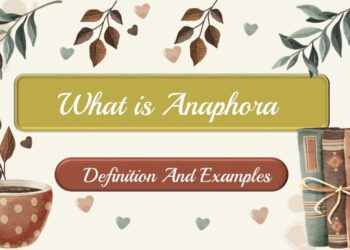What is Euphemism Definition And Examples
Euphemism is a literary and linguistic term that refers to the use of indirect, milder, or more socially acceptable expressions to replace harsh, offensive, or unpleasant words or phrases. It involves the substitution of words or phrases that are considered more polite, tactful, or less blunt, often with the intention of softening the impact of a statement or addressing sensitive topics in a more delicate manner.
The use of euphemism is prevalent in various aspects of human communication, including literature, everyday speech, politics, advertising, and public discourse. What is Euphemism Definition And Examples By employing euphemistic language, speakers or writers seek to convey their message while maintaining social decorum, avoiding discomfort or offense, or mitigating potentially harsh or controversial statements.
Also Read-
- What is Epiphany Definition And Examples
- What is Diction Definition And Examples
- What is Denotation Definition And Examples
Euphemisms can serve several purposes, such as:
- Politeness: Euphemisms are commonly used to avoid causing offense or discomfort to others. For example, instead of directly stating that someone has passed away, phrases like “passed on,” “departed,” or “no longer with us” are used to convey the same meaning in a more gentle manner.
- Taboo or Sensitive Topics: Euphemisms are employed to discuss taboo subjects or sensitive topics without being overly explicit or graphic. What is Euphemism Definition And Examples For instance, phrases like “bathroom,” “restroom,” or “powder room” are used as euphemisms for “toilet” or “lavatory.”
- Delicate Language: Euphemisms can be utilized to discuss topics that might be embarrassing, uncomfortable, or inappropriate in a more subtle or veiled manner. What is Euphemism Definition And Examples This can include references to bodily functions, sexuality, or medical conditions.
- Social or Political Sensitivity: Euphemistic language is often used in the context of social or political issues to present information in a way that is more politically correct or less controversial. For instance, terms like “differently abled” or “challenged” are used as euphemisms for “disabled.”
- Corporate or Professional Contexts: Euphemisms are frequently employed in business or professional settings to soften negative or critical feedback. What is Euphemism Definition And Examples Instead of directly stating that an employee has been fired, phrases like “let go,” “downsized,” or “restructured” may be used.
Euphemisms can take various forms, including single words, phrases, or even longer expressions. What is Euphemism Definition And Examples They can be created through metaphorical language, substitution, or euphemistic circumlocution, where the intended meaning is implied rather than directly stated.
However, it is important to note that euphemisms can sometimes be seen as misleading or deceptive, as they can obscure the true nature of a situation or dilute its impact. What is Euphemism Definition And Examples They can also reflect societal taboos or avoid addressing important issues directly. What is Euphemism Definition And Examples Additionally, the effectiveness of euphemisms can vary depending on cultural and contextual factors, as well as individual interpretations.
In literature, euphemisms are often used to create a particular tone, evoke certain emotions, or depict characters and their attitudes. What is Euphemism Definition And Examples Authors may employ euphemistic language to highlight social norms, explore the power of language, or portray the complexity of human communication.
Examples Of Euphemism
There are the some exapmes-
- “Senior citizen” – This term is a euphemism for an elderly or older person. It is used to convey respect and avoid the potentially negative connotations associated with terms like “old person” or “elderly.”
- “Correctional facility” – This euphemism is often used in place of the word “prison” to describe a place of incarceration. It aims to soften the harshness of the term and focus on the rehabilitative aspect of the institution.
- “Letting someone go” – This phrase is commonly used as a euphemism for terminating an employee or firing someone. It is a softer way of conveying the same meaning without using direct and potentially hurtful language.
- “Passing away” – This euphemism is frequently used instead of the word “dying” or “death.” It is a more gentle and sensitive way of referring to someone’s passing and is often used to show respect for the deceased and offer condolences.
- “Bathroom” or “restroom” – These terms are euphemisms for a toilet or lavatory. They are used to provide a more polite and socially acceptable way of referring to the facilities without being overly explicit.
- “Vertically challenged” – This phrase is a euphemism for being short in height. It is a light-hearted and playful way of addressing the topic without directly using the word “short.”
Conclusion
Euphemism is a linguistic and literary device used to substitute harsh, offensive, or unpleasant words or phrases with milder, indirect, or more socially acceptable expressions. What is Euphemism Definition And Examples Euphemisms serve various purposes, including politeness, addressing taboo topics, delicacy, social or political sensitivity, and corporate contexts. What is Euphemism Definition And Examples They can be found in everyday speech, literature, advertising, and public discourse. What is Euphemism Definition And Examples Euphemisms play a significant role in maintaining social decorum, avoiding discomfort or offense, and softening the impact of certain statements or topics. However, they can also be seen as misleading or evasive, and their effectiveness can vary based on cultural and contextual factors.
FAQ.
Q: Why do people use euphemisms?
A: People use euphemisms to maintain politeness, address sensitive or taboo topics delicately, soften the impact of statements, adhere to social norms, and avoid offense or discomfort.
Q: Can euphemisms be misleading?
A: Yes, euphemisms can sometimes be seen as misleading or deceptive, as they may obscure the true nature of a situation or dilute its impact. They can also reflect societal taboos or avoid addressing important issues directly.
Q: Are all euphemisms universally understood?
A: No, the understanding and effectiveness of euphemisms can vary based on cultural and contextual factors. Different cultures or individuals may interpret euphemistic expressions differently.
Q: Can euphemisms change over time?
A: Yes, euphemisms can evolve and change over time as societal norms and attitudes shift. Expressions that were once considered euphemistic may lose their effectiveness or become outdated.
Q: Do euphemisms play a role in literature?
A: Yes, euphemisms are commonly used in literature to create specific tones, portray characters, and explore the complexities of human communication. They can contribute to characterization and the overall atmosphere of a literary work.

















